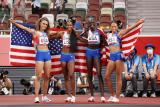Folders |
U.S. 4x400 Relays Deliver on Promise of Gold in Final Track SessionPublished by
Athing Mu, Rai Benjamin Anchor U.S. Teams To Sixth And Seventh Gold Medals In Tokyo; Felix Claims Record-Breaking 11th Medal By Doug Binder, DyeStat Editor Getty Images/Reuters A pair of cathartic 4x400-meter relay wins, building upon Molly Seidel's uplifting and unexpected bronze in the women's marathon, brought a feel-good close to the track and field portion of the Tokyo Games for the United States. A "Dream Team" quartet of Sydney McLaughlin, Allyson Felix, Dalilah Muhammad and Athing Mu ran the fastest women's 4x400 relay in 28 years and the fifth-fastest of all-time, with 3:16.85 to give the Americans their seventh consecutive Olympic victory. Mu, the youngest athlete in the race at 19, split 48.32 seconds on the anchor leg as all four members of the team added a second medal. For Felix, it was a record-breaking 11th overall medal that broke an all-time U.S. record with legendary sprinter and long jumper Carl Lewis, along with jumper Ray Ewry. Only distance runner Paavo Nurmi of Finland, who accumulated 12 Olympic medals from 1920-28, has more than Felix, who became the oldest gold medalist in the 4x400 in Olympic history at age 35. The men's team of Michael Cherry, Michael Norman, Bryce Deadmon and Rai Benjamin brought the U.S. its first and only win on the track. The only other gold medal for the men came from shot putter Ryan Crouser. Benjamin split 43.40 on the anchor leg and added a gold medal to the silver he earned in a mind-bending 400-meter hurdles final. The group clocked 2:55.70 for No. 4 in world history and came near the Olympic record of 2:55.39 set by the U.S. in 2008. The Netherlands and Botswana, a landlocked African nation of just 2.3 million people, secured the silver and bronze medals, respectively, with national record performances. The relays amounted to an important rebound for a U.S. team that made a generational shift in 2021 in the midst of a challening year as new stars like Mu (19), Cole Hocker (20), Erriyon Knighton (17), Jasmine Moore (20) and KC Lightfoot (21) showed that the future is bright. In a highly anticipated and entertaining men's 1,500 meters final, Norwegian prodigy Jakob Ingebrigtsen broke the Olympic Games record and rolled past world champion Timothy Cheruiyot of Kenya off the final curve for gold in an astonishing 3:28.32. It marked the first win for Ingebrigtsen against Cheruiyot in 13 career head-to-head matchups. Josh Kerr ran a sensational race for the bronze for Great Britain and his Seattle-based Brooks Beasts team, in 3:29.05. The performance was a Scottish national record for Kerr and only Mo Farah (3:28.81) has ever run faster among competitors representing the United Kingdom. Hocker, who was unaccustomed to being in such a fast race, left himself too much gap to cover in the final 400 but moved from ninth to sixth and became the No. 8 performer in U.S. history with 3:31.40. It was a two-second personal best. In the women's 10,000 meters, the incomparable Sifan Hassan of The Netherlands came back from a bronze medal in the 1,500 to pair a second gold with the 5,000 meters victory she scored six days earlier. Hassan ran 29:55.32 and beat Kalkidan Gezahegne of Burundi (29.56.18) on precious little sleep. Hassan's triple will go down as one of the greatest feats in distance running in Olympic history. Only Nurmi (1924) and fellow Finnish athlete Ville Ritola (1928) have both medaled in three individual men's distance events in the same Olympics, but Hassan is the first competitor to ever medal in the 1,500, 5,000 and 10,000 in one Olympic Games. Fanny Blankers-Koen is the only other Dutch female track and field athlete to earn three individual medals in the same Olympics, winning gold in the 80-meter hurdles, 100 and 200, along with contributing to a 4x100 relay victory in 1948. "I don't know how I did it," Hassan told NBC broadcaster Lewis Johnson. "I just believed in myself. I cried at the ceremony because all of the stress is gone. I can't believe I did it." The three Americans finished within 12 seconds of one another, in 10th (Emily Sisson), 12th (Karissa Schweizer) and 13th (Alicia Monson). Neeraj Chopra made history in the men's javelin with the first track and field medal for India, a nation with 1.3 billion people that will celebrate a surprising gold. Chopra launched the two farthest throws of the competition on his first two attempts and his 287-4 (87.58m) second attempt was the winner. Czech Republic teammates Jakub Vadlejch and Vitezslav Vesely took silver and bronze. World leader Johannes Vetter of Germany finished ninth and did not qualify to take the final three attempts in the finals. In the women's high jump, Russian Olympic Committee athlete Mariya Lasitskene went to her hands and knees and wept tears of joy and relief after winning a long-sought gold medal with a clearance at 6-8.25 (2.04m). Lasitskene was barred from competing in 2016 because of the Russian doping scandal despite being the best jumper in the world. Australian jumper Nicola McDermott broke the Oceanic record with 6-7.50 (2.02m) and barely missed joining Lasitskene at 2.04m on her final attempt. American champion Vashti Cunningham, competing in her second Olympic Games at 23, missed twice at 6-6 (1.98m) and once at 6-6.75 (2.00m) and finished sixth. With just one event left to go, the men's marathon, the U.S. team has 26 total medals in athletics, including seven golds. That's on par with the collective efforts of 2004 (25 medals, seven golds in Athens) and 2008 (25 medals, seven golds in Beijing) teams and behind 2012 (28 medals, nine golds in London) and 2016 (32 medals, 13 golds in Rio). Seidel's marathon bronze -- the third medal for a U.S. woman in the Olympic marathon -- was a surprising jolt of good fortune for the American running community. The Wisconsin native, a 2011 Foot Locker Cross Country champion in high school, went toe to toe with the best women in the world in searing heat and humidity on the streets of Sapporo. "I try not to have too many expectations," Seidel said. "It is just to go out, stick your nose where it doesn’t belong and try and make some people angry. My goal today was just to go in and for people to think, 'Who the hell is this girl?'" More news |











